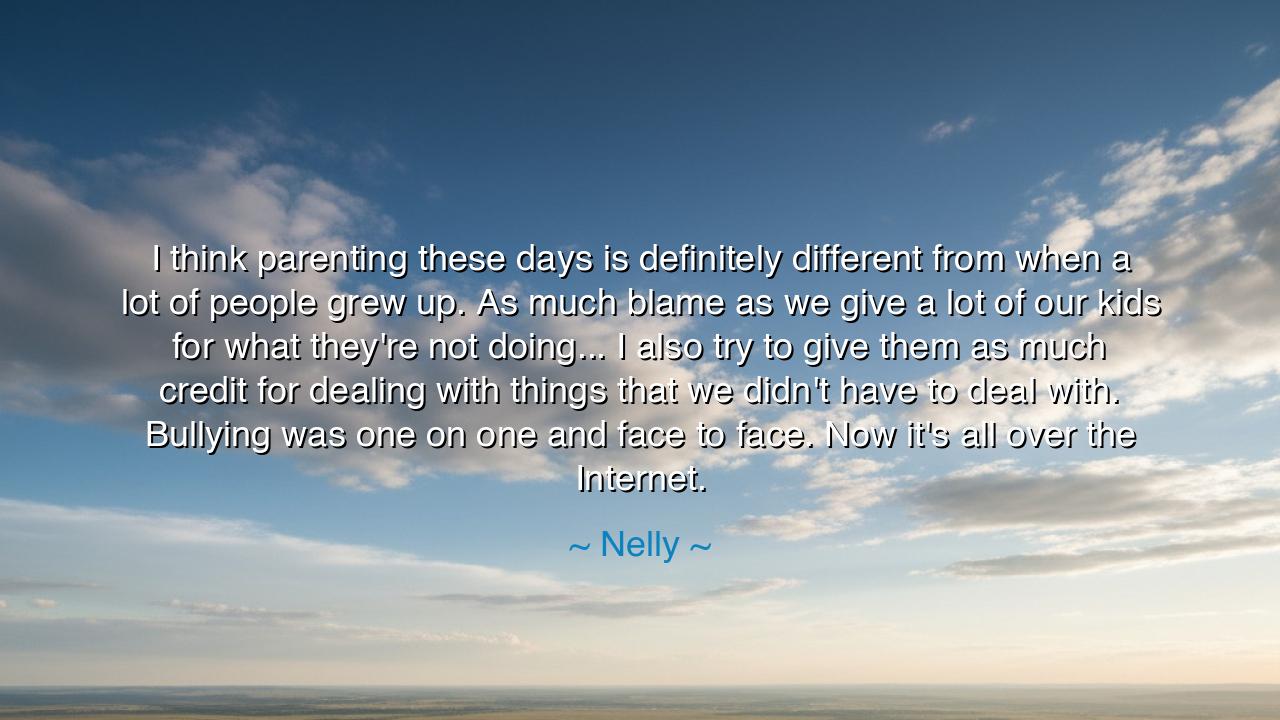
I think parenting these days is definitely different from when a
I think parenting these days is definitely different from when a lot of people grew up. As much blame as we give a lot of our kids for what they're not doing... I also try to give them as much credit for dealing with things that we didn't have to deal with. Bullying was one on one and face to face. Now it's all over the Internet.






Hear the voice of Nelly, who speaks not as a critic alone, but as one who understands both past and present: “I think parenting these days is definitely different from when a lot of people grew up. As much blame as we give a lot of our kids for what they're not doing... I also try to give them as much credit for dealing with things that we didn't have to deal with. Bullying was one on one and face to face. Now it's all over the Internet.” These words are both warning and compassion. They remind us that while children today stumble in familiar ways, they also walk roads that their parents never knew—roads filled with shadows of the digital age.
In the days of old, bullying was indeed a physical presence. A child’s tormentor could be seen, confronted, or avoided. The wound was real, but it was bounded by time and space. When the school day ended, the home could be a refuge, the hearth a sanctuary. Yet now, as Nelly observes, the battlefield has expanded beyond measure. The Internet has no walls, no hours, no escape. A cruel word, once whispered in the corner of a playground, now echoes endlessly across screens, multiplied by the eyes of strangers. Children fight wars not only of body but of spirit, wars that follow them into their bedrooms, their dreams, their very sense of self.
This transformation makes parenting different, as Nelly declares. For parents cannot protect their children by merely locking the door or scolding the bully at the gate. The enemy seeps through unseen pathways, through glowing devices and hidden networks. Thus, parents must learn new forms of vigilance, new ways of listening and guiding. To dismiss the struggles of today’s children as weakness is to ignore the heavier burdens they bear. Wisdom demands that we recognize the courage it takes simply to grow up in a world where judgment never sleeps and cruelty can be broadcast to all.
Consider the ancient story of Socrates, who chose death rather than abandon his truth in the face of relentless public scrutiny. He was hounded by voices that twisted his words, mocked his teaching, and condemned his way of life. What Socrates endured from the citizens of Athens, today’s children face on a scale far greater—mockery from faceless masses, accusations flung without pause, reputations shattered in an instant. And yet, like Socrates, many endure, refusing to be crushed. In this, Nelly calls us to see not only the failures of youth, but their hidden strength.
Parents, then, must walk with humility. Blame is easy, credit is harder. To say, “Children are lazy, ungrateful, distracted,” is simple. To acknowledge, “Children are brave for enduring trials we never faced,” is wisdom. Nelly’s words remind us that parenting is not only discipline but empathy—an awareness that our children’s world is harsher in ways unseen, and that survival in it is already an act of resilience.
The lesson is clear: honor the struggles of your children as much as you correct them. Guide them through discipline, yes, but also through understanding. Speak not only with commands, but with compassion. Ask not only, “Why are you failing?” but also, “How are you surviving?” For in doing so, you teach your children not only to obey, but to trust, and trust is the shield that will carry them through trials parents cannot always fight on their behalf.
Therefore, let every parent and elder who hears these words take action: learn the battles of this age, speak gently in moments of despair, and remember that your children walk paths you never walked. Stand as guides, not as judges. Offer both discipline and mercy, both protection and praise. For though the tools of cruelty have changed, the need for love remains eternal.
Thus Nelly’s words, born of both memory and vision, reveal the truth of our times: parenting is different now, not because children have weakened, but because the world has grown harsher in silence and more ruthless in scope. And if parents learn to see with compassion, they will not only raise stronger children—they will raise a stronger generation.






AAdministratorAdministrator
Welcome, honored guests. Please leave a comment, we will respond soon